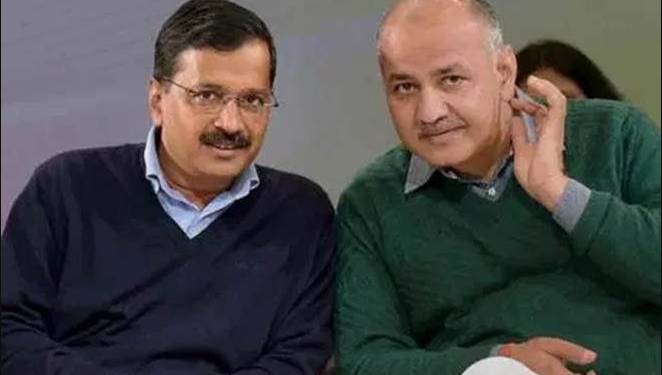The National Capital of India, Delhi went to polls today. The elections are keenly contested and covered extensively by the mainstream media. But what many missed was the central role that Delhi’s Deputy Chief Minister, Manish Sisodia, came to occupy in AAP’s Delhi Assembly polls campaign.
The elections are being touted as a referendum on the Citizenship Amendment Act (CAA), but not many seem to understand how this also marks the rise of an ambitious Manish Sisodia.
Kejriwal has always been the face of the Aam Aadmi Party (AAP) ever since the days of the party’s inception which traces its origin to Anna Hazare’s anti corruption movement.
However, Kejriwal never really occupied that kind of a dominant role in the AAP-led Delhi government. For a major part of the tenure of his government, he was a Chief Minister without portfolio, something that doesn’t really reflect his status of a dominant supremo in his party’s power structure.
While Kejriwal was a “CM with no portfolio”, his deputy, Sisodia did most of the heavy lifting. He handled several portfolios- Finance, Planning, Tourism, Land & Building, Women & Child, Art, Culture & Languages and most importantly, the Education Ministry.
Sisodia was seen as the man of action. The AAP poll campaign was mostly centred around what the party claims to be world-class school education system in Delhi. Sisodia being the Education Minister, the AAP had to inevitably project him as an efficient, high-performing Minister.
While Sisodia enjoyed the image of a performer, Kejriwal’s image has taken a hit. He could never really be credited with having achieved anything substantial. The most he could do to grab attention was to announce populist measures like free DTC bus rides for women or the Odd-Even scheme, which clearly did not resonate much with the people of Delhi.
Moreover, Sisodia enjoys the image of an efficient, quiet achiever. He has not really become a shadow of Kejriwal, rather he has emerged as the face of the governance model that AAP has been trying to propagate.
Kejriwal, on the other hand, got severely criticised for his confrontational attitude. Compared to Sisodia’s calm persona, Kejriwal emerged as the one who did all the dirty work- making unsavoury remarks about PM Modi, making untenable allegations of EVM tampering and worse of all asking for the proof of Indian Army’s surgical strikes against Pakistan.
Sisodia has been associated with Kejriwal ever since the days of Kejriwal’s NGO, Parivartan. In fact, Sisodia was the first to volunteer for Kejriwal’s NGO in the year 1998.
Once he joined Kejriwal, Sisodia remained in close touch with the Delhi CM at all important phases of his public life. Ultimately, the Delhi Deputy CM, Manish Sisodia emerged as the closest confidante of the AAP supremo, Kejriwal.
Former AAP leader, Shazia Ilmi had even blamed Sisodia of cutting off Kejriwal from the rest of the party leaders such as Yogendra Yadav and Prashant Bhushan who were expelled from the party in the year 2015.
Kejriwal has always trusted his lieutenant, Sisodia and even dismissed possibilities of Sisodia harbouring any aspirations. He said, “There is no personal ambition. Na use kuch kamake le jaana, na mujhe. Woh bhi khush hai, main bhi khush.” He added, “Hum bahut chhote log hain. Is desh ke log ne bahut pyaar diya, bahut mohabbat di hai, bahut vishwas kiya hai hum logon pe.”
Kejriwal had to claim modesty and humility, since that is, of course, a part of his party’s PR strategy. The days preceding the Delhi Assembly polls however tell a completely story.
Delhi Assembly polls campaign room place in the backdrop of anti CAA violence and protests. The Kejriwal led party had also tried capitalising politically on the anti CAA protests.
Sisodia had even gone on to support the Shaheen Bagh protests. He had said that he stood with the people protesting in Shaheen Bagh and blocking a crucial roadway.
And this is exactly where the idea of Sisodia trying to overthrow Kejriwal comes into picture. Sisodia’s support for Shaheen Bagh protests is entirely inconsistent with what the Delhi CM opined about the same.
Kejriwal had said, “If Delhi Police was under our jurisdiction, we would have opened the Shaheen Bagh roads in 2 hours.”
"If Delhi Police was under our jurisdiction, we would have opened the Shaheen Bagh roads in 2 hours": #KejriwalToNDTV #DelhiElections2020 #NDTVExclusive pic.twitter.com/K86cG2AmP2
— NDTV (@ndtv) February 4, 2020
AAP is not a cadre-based party like the BJP. It is a supremo based party, and therefore Kejriwal’s word is supposed to be the last word. No other party leader or minister, least of all his number 2, is supposed to have a different opinion.
But Sisodia happens to have a different opinion, something that doesn’t go with the party’s power structure.
It is Manish Sisodia’s calm persona, opposed to Kejriwal’s politically untenable image of a controversial, attention-seeking politician that gives the former a clear advantage.
Moreover, Sisodia’s central role during the Assembly polls campaign is suggestive of how he might be nursing ambitions to overthrow his political boss.
After all, no one wants to remain an inferior/ subordinate in politics. Why would Sisodia want to be a pale shadow of Kejriwal? Why would Sisodia not want to be the Chief Minister of India’s National Capital, if given an opportunity?
Also Kejriwal is at the peak of his political career. He has age on his side, and at 51 he is only three years older than Sisodia. Delhi Deputy CM would know that he cannot succeed the political legacy of his immediate boss.
If he has to occupy the coveted top post in Delhi, Sisodia will have to carry out a coup within the AAP, a serious question that arises is if he will ultimately look to dethrone Kejriwal. As of now he, at least, seems to be in a position to overthrow his superior.























